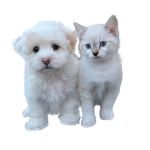Guinea pigs are vegetative feeders and do not require water for drinking when given sufficiently moist food, but must have access to water if they are fed with commercial dry feed.
What are the best components for a guinea pig diet?
They require to be fed the types of food to which they have adapted.
An important thing to keep in mind is that new foods should be introduced gradually to allow your guinea pigs’ digestive system to adjust.
Guinea pigs will develop food preferences from a very early age and they do not adapt easily to changes in the type, appearance or presentation of food or water.
Grass or Hay?
Guinea pigs need a constant supply of grass or hay.
As their teeth are continually growing, they need a lot of fiber to chew on.
A good quality grass or hay will keep them chewing for long period of time.
This wears down their teeth and helps prevent serious dental problems.
It is very important to provide them with sufficient fiber in their diet, both for their digestive system and for their overall health.
A poor diet can cause the guinea pig’s digestive system to be altered, and it can result in diarrhea in our pets.
Alfalfa is also an excellent source of calcium.
What about greens?
Give your guinea pig a variety of leafy greens and fresh herbs on a daily basis.
Make sure to include fresh leafy greens such as romaine lettuce, arugula, dandelion leaves, and snow peas.
Herbs like parsley, cilantro, and basil are appropriate for your guinea pigs.
Other foods that are also good a few times a week are broccoli, cabbage, zucchini, cucumber and carrot top.
High sugar vegetables, such as baby carrots, bell pepper, tomatoes and corn should be avoided.
Vitamin C and Fruits
Provide a daily source of 10-50 mg Vitamin C because it is vital for guinea pigs, depending on the age and health condition of the pet.
To prevent vitamin C deficiency, guinea pigs should receive a vitamin C supplement, either as a tablet or liquid given by mouth.
It is not recommendable to put the vitamin C in the drinking water, as the vitamin breaks down rapidly in water and loses its potency.
Fruits like oranges, apples, pears, kiwi, blueberries and pineapple are a good source of Vitamin C but only feed them a few times a week because these foods have a high level of sugar.
Diarrhea in Guinea Pigs
Guinea pigs should always eat and defecate.
Health issues guinea pigs may present sometimes are related to a sudden change in diet components.
Diarrhea is one of these examples and it is extremely dangerous for them.
It is a reason to go quickly to the veterinarian as it can be fatal.
The danger of diarrhea is dehydration.
In case they are not drinking on their own, then we will have to provide them with water with a syringe.
Another important aspect is to observe their nose. A stuffy nose is an indication that they are sick and we should take them immediately to the veterinarian.
If we observe bright pasty feces, we have to be cautious and try not to add new food to the animal because probably something that we have fed it has not been very good for it
Possible causes for diarrhea are:
- Diet-related
- When it is too low in fiber. Guinea pigs should eat basically hay (at least 70% of their diet).
- If there has been a change in diet (for example when introducing a vegetable they have never tried before).
- Lack of vitamin C.
- Dental problems.
- Excess of vegetables.
Give small portions of vegetables daily (only 20% of vegetables per day)
Other clinical signs that may occur with diarrhea include:
- Weight loss,
- Dehydration,
- Anorexia,
- Lack of energy,
- Low body temperature
If a guinea pig stops eating is a medical emergency, and it requires to be seen by a veterinarian as soon as possible.


